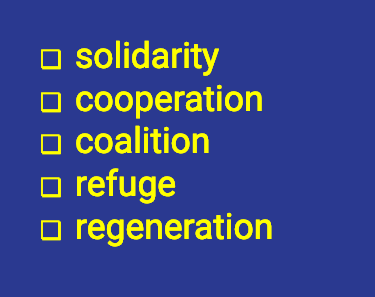I showed up to work one morning and Robin had put a print-out of a slide from my Northeast OER Summit presentation on the front door of the CoLab office. The slide offers five words that I have come to think of as my bedrock values when working on open pedagogies: solidarity, cooperation, coalition, refuge, regeneration. Those words began as an attempt to do for myself what Rajiv Jhangiani did with his “5Rs for Open Pedagogy”: to create a set of values for this work. As Rajiv says in that post, his 5Rs are not necessarily everybody’s else’s, because any such values are “personal, subjective, and contextual.”
The word values is a little difficult for me to embrace, simply because the word has so often been co-opted by right-wing people to mean something oppressive. But we need values to guide us, and we can’t cede talk of values to people who only want to use their idea of values as a weapon against the rest of us.
My own five values have held up better than I imagined they would. I think this is because of how I came up with them. I knew I did not want another set of alliterative words. I wanted to know the actual values I hold dearest, and I couldn’t do that if I were beholden to alphabetic restrictions. To come up with the words, I thought about the kinds of words I use when describing the sorts of pedagogies I am most passionate about, and I thought about the words that incite a sense of possibility in my own imagination when I hear them. All are words I’ve been thinking about for a while in various contexts. Bringing them together felt like a logical culmination.
Robin has asked me to come up with brief explanations of each and their application to the kinds of work we do. I thought I might draft that out here…

Solidarity
A sense of shared purpose that creates a unity between otherwise separate people and groups. Solidarity implies action, working together, creating community. Within this community of scholars, our purpose is shared. We learn together.
Cooperation
Schools need staff, faculty, and students to feel a sense of cooperation with each other rather than a sense of competition against each other. We help each other, and we are not afraid to ask for help when we need it ourselves. We do not seek to profit off of each other, but to flourish together. We do not work against, we work alongside.
Coalition
When separate, distinct elements work together, they form a coalition. The elements do not meld together but stand alongside. They may, in other contexts, be at odds. Coalitions are usually temporary. They are ways to get things done, and often they require compromise between elements, the recognition of greater goals than individual ones. Your priorities may not be my priorities, but if we have some priorities in common, we can form a coalition and achieve more than we would have on our own. Being open to coalition means being open to difference without seeking to erase the difference or subsume it into yourself. Coalitions can be fraught, frustrating, even painful. But they can also change the world.
Refuge
The world is a dangerous, wounding place, and schools, as institutions in the world, are not free of danger, nor free of wounds. We may arrive banged up and in need of healing before we can really learn what we most need to learn. The process of learning itself may bruise and lacerate. We learn best when we are not still bleeding, not still starving. We learn best when we know what to do with our pain, or when, at least, we know that there is somewhere where our pain will not be used against us. We learn best when we have shelter and some food. What will it take for school to be a refuge for the seekers, the wonderers, the learners?
Regeneration
If something has been emptied out, worn down, or exhausted, it needs regeneration. There is much we need to regrow and much we ought to return to the wild. We must regenerate a sense of education as a public good, of the commons as fertile land, not tragedy. We must regenerate the idea of learning as itself of value. We must seek out practices that regenerate our passions, that regrow our sense of possibility, that rewild our minds. We must let go of the obsessions that scour the world to dust. We must not embrace growth for its own sake, but rather seek out a wildness that stands against monocultures and monopolies, a wilderness of rhizomes, a wild life of mutual aid and mutual wonder.
